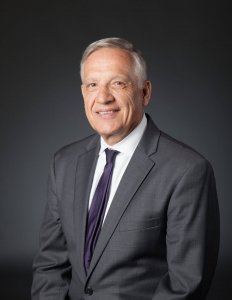The Dean’s Message

Dean Yannis C. Yortsos
In 1972, USC launched the Information Sciences Institute (ISI), which helped develop, design, and run the Internet, including communications protocols that remain fundamental to this day. ISI engineers created the .com and developed the Voice over Internet Protocol — Zoom, anyone? — and launched the first operational quantum computer of any university worldwide.
Building on our longtime excellence in computing, which also includes the Institute for Creative Technologies (ICT), USC President Carol Folt announced in April the Frontiers of Computing. This billion-dollar initiative, made possible by a gift from the Lord Foundation, will position USC at the forefront of the ongoing technology revolution for the benefit of society.
Frontiers will feature the School of Advanced Computing, which will build upon the amazing work already happening throughout USC Viterbi, leveraging the strengths of our outstanding departments. The new school will be housed within the Viterbi School and will include the Information Technology Program (ITP), data sciences, faculty affinity groups and centers and more.
Frontiers will consolidate USC Viterbi’s (and USC’s) leadership in advanced, human-centric computing, artificial intelligence, quantum information, blockchain technology, electronics and new chip designs, and other digital fields. This represents a true inflection point for the university, especially for USC Viterbi. We couldn’t be more excited."
YANNIS C. YORTSOS
Dean, USC Viterbi
School of Engineering
About the Dean
Yannis C. Yortsos is the Dean of the University of Southern California (USC) Viterbi School of Engineering and the Zohrab Kaprielian Dean’s Chair in Engineering, a position he has held since 2005. Yortsos joined the USC faculty of Chemical and Petroleum Engineering in 1978.
He received a BS degree in Chemical Engineering from the National Technical University of Athens, Greece, and MS and PhD degrees from the California Institute of Technology, all in chemical engineering. His research area is in fluid flow, transport, and reaction processes in porous media with specific application to the subsurface. More recently, and prompted by the COVID-19 pandemic, he has published on the spreading of epidemics.
Yortsos was elected to the National Academy of Engineering (NAE) in 2008, where he has also served as secretary, vice-chair, and chair of Section 11 and as a member of the NAE Council (2017-2023). In 2010, he organized and hosted the NAE Second Grand Challenges Summit, and he continues to serve on the organizing committee of the bi-annual Global Grand Challenges Summits hosted by the NAE, the Royal Academy of Engineering, and the Chinese Academy of Engineering. In 2011 he was awarded the distinction of honorary member of the AIME. In 2013, he was elected an Associate Member of the Academy of Athens. In 2022, he received the Gordon Prize from the Academy for co-founding the Grand Challenges Scholars Program.
In 2008, he articulated the concept of Engineering+, positioning engineering as the enabling discipline of our times, and has been actively engaged in the effort to “change the conversation about engineering.” and spearheaded in 2015 an engineering diversity initiative that more than 250 engineering schools now adopt. In recognition of these initiatives, the USC Viterbi School of Engineering received in 2017 the ASEE President’s Award. As a result of this change in narrative, USC Viterbi attracts a large number of previously under-represented demographic groups in engineering- and since 2019, the entering Fall class has been gender-balanced. For his leadership in this area, he received the 2023 GMiS Chairman’s Award, Great Minds in STEM.
In 2022, he was a co-recipient of a Los Angeles area Emmy for the USC Viterbi documentary Lives not Grades, which documented the journey of USC engineering students to a refugee camp in the Greek island of Lesvos and their effort to provide technology solutions to improve their condition.
Yortsos was the principal investigator of the National Science Foundation Innovation Corps (NSF I-Corps) Innovation Node Los Angeles (2014-2021) and the NSF Gender Equity Initiative EDGE (2018-2021) and currently serves as the principal investigator of the NSF I-Corps Innovation Hub: West (2022-2027).
He is currently the Editor-in-Chief of PNAS Nexus, the new open-access journal from the National Academy of Sciences.
Published on October 18th, 2016
Last updated on April 24th, 2024







